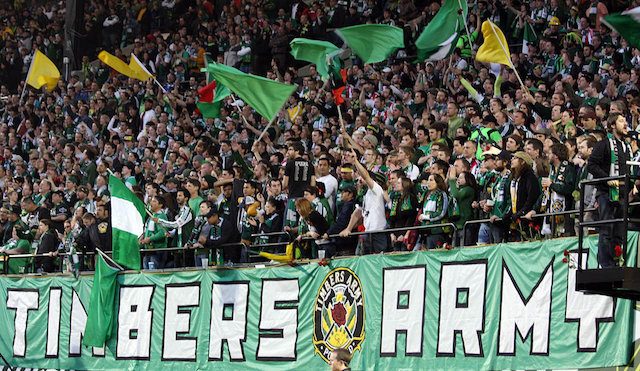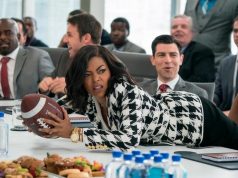
It is popular everywhere in the world except the United States. Americans tend to make fun of it, though a growing number support it fervently and seek to convert others. It is impossible for someone who loves it and someone who hates it to discuss it without the person who loves it being condescending and the person who hates it being stubborn. The answer? Soccer, though we also would have accepted socialized medicine.
Everyone plays soccer as a kid, even Americans. It’s a good sport for kids because it combines their natural fondness for running around with their natural fondness for kicking things. You don’t have to be tall to be a good player (as in basketball), or burly (as in football), or Canadian (as in hockey). Unlike baseball, where the players just stand around a lot of the time and you can have someone else run for you if you don’t feel like it, soccer is a game of constant motion. In a typical 90-minute match, the players might run a combined total of as much as 130 miles and score as many as one goal. It is frequently called “the beautiful game,” though obviously only by people who have never seen Magic: The Gathering.
But as a spectator sport for grown-ups, soccer has never been as popular in the U.S. as other sports. Not consistently, anyway. It gets very popular whenever the World Cup is happening, and especially if the U.S. team is doing well, because we Americans like to pretend we are interested in things if we have a chance of winning them. Once we’re eliminated from the competition we go back to not caring. We did the same thing with the Stanley Cup finals, the Olympics, and Vietnam.
Professional soccer does have its fans in the United States, though, and they are a rabid, devoted bunch. I live in Portland, where soccer (and, for that matter, socialized medicine) has a particularly strong following. We had a minor-league team called the Timbers from 2001-2010, and it was so popular that it graduated to Major League Soccer. Not the players, mind you, just the name “the Timbers.” The players were all sent to other minor-league teams, or euthanized, and replaced with MLS players, who came from wherever big-league soccer players come from. (England? Brazil? I don’t know.) The new Portland Timbers play at Jeld-Wen Field, which used to be called PGE Park and was home to both the minor-league Timbers and a minor-league baseball team called the Beavers. But the Beavers don’t play there anymore. They now play at a stadium slightly south of Portland, in a place called Arizona.
There was a minor brouhaha about all this. The Timbers and Beavers used to share PGE Park just fine, I guess. Grounds crews would make the necessary adjustments to the field between game days, the way custodians turn school cafeterias into auditoriums when there’s an assembly. But that arrangement wasn’t going to work once the Timbers became an MLS team, because MLS has different guidelines. Among those guidelines: an MLS team may not share a field with a baseball team, especially not one called the Beavers. (“Don’t be ridiculous,” say the MLS guidelines. “Seriously, ‘Beavers’?”) There were also concerns about the park’s seating configuration and the field’s playing surface. The MLS commissioner told Portland that the league would not bring a Major League Soccer team to the city unless PGE Park was renovated and the Beavers evicted.
So. We had ourselves a good old-fashioned Mexican standoff. It didn’t last long, though, once it was pointed out that bringing Major League Soccer to Portland would be a boon to the city, and that no one cared about the Beavers anyway. It was sad but true. The Timbers had a huge army of loyal fans, like the European soccer teams do, where they chant and cheer and wear costumes and generally behave in a raucous, beer-enhanced manner. Timbers games were always well attended. It was this enthusiasm that had attracted the attention of the MLS in the first place. The Beavers, meanwhile, played their boring games in front of empty stands. Their mascot was some guy in a ratty old beaver costume, while the Timbers had an actual chainsaw-wielding lumberjack. There was no contest. None of the possibilities for a new Beavers stadium panned out, and the team was sold.
Last summer, after living in Portland for five years, I finally went to a Beavers game and a Timbers game. (They were different games. If they’d played against each other, now THAT would have been something.) It was the final season for both teams as we knew them, as well as for PGE Park as we knew it, and I wanted to be part of history, and also I had free tickets. I’m not generally a big sports fan, but I do enjoy sitting outside with friends on a pleasant summer evening, and if a sporting event should happen to break out in front of us, so be it.
The Beavers game was poorly attended. The Beavers played badly. My friend Kourtney got beaned by a foul ball. GOOD RIDDANCE, BEAVERS.
The Timbers game, a month or so later, was packed, and occupying a huge chunk of the stands was the aforementioned Timbers Army, a cult of ferocious fans who have sworn a sacred oath to cheer and support their squad of shinguarded heroes forever. The Timbers Army is like a religion, and game day is their sabbath, and their pope has a chainsaw. (Don’t you wish YOUR pope had a chainsaw?) If a member of the Timbers Army moves to another city that has a soccer team, and it is discovered that he has switched allegiances, the Timbers Army will murder him and bathe in his blood. (This is legal in Europe. It’s more of a gray area here.) Once you have heard the Timbers Army’s thunderous singing, drum-beating, and unison chanting for 90 solid minutes, you’ll never hear anything else like it. If you sat too close to them, you’ll never hear anything else at all.
Because of the World Cup fever that had recently swept the world like influenza, some people at the Timbers game had brought vuvuzelas. You will recall that a vuvuzela is a terrible thing from South Africa that makes loud, unnecessary noise, which is also a pretty good description of Charlize Theron. The Timbers Army did not approve of vuvuzelas, much less of the johnnies-come-lately who used them. Blowing a vuvuzela was a good way to let people know that you were a bandwagon-jumper and not a real soccer fan, and also that you were an obnoxious idiot. I don’t know why you would want to draw attention to these facts, but people did.
This was the first professional soccer game I’d ever attended, and I was curious to see how it compared to my expectations. For example, I knew that soccer had a reputation for being really boring. Why is that? Well, it turns out it’s because soccer is really boring. But I don’t see how it’s inherently any more boring than, say, NASCAR, which also has people moving around very fast while accomplishing very little, and also has wildly enthusiastic fans. The only difference between a soccer game in Argentina and a NASCAR race in America is that the fans at the soccer game probably speak better English.
And soccer keeps moving, without the constant stopping and starting you get in other sports. Ninety minutes of game time takes about 90 minutes. Compare that to football, where they have to stop the clock every few seconds to allow the players to renegotiate their contracts, appear in commercials, be served with subpoenas, etc. Soccer may not be a terribly exciting game, but neither is football, and at least soccer is over faster, so there.
Actually, the atmosphere at the Timbers game went electric every time the ball came within kicking distance of one of the goals. The crowd was always thrilled at the prospect of a goal being scored, even though we knew that the odds of such a thing actually occurring were microscopic. It was like when you play the lottery, and you have that little twinge of excitement when they read off the winning numbers. You’re almost certainly not going to win, but hey, what if?? In that sense, a soccer game represents everlasting hope in the face of probable disappointment. And what’s more American than that?
[ Was this originally published with the vuvuzela credited to South America, and Shakira in place of Charlize Theron? And was it quickly fixed after my brother pointed out my mistake? You cannot prove it. ]




